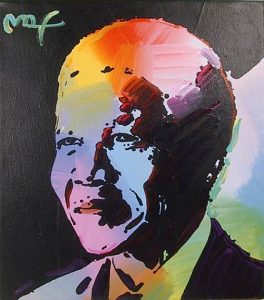Ezekiel 37:1-14
This text is used for the Lectionary Year A on April 2, 2017.
 On February 11, 1990, Nelson Mandela walked out of the Victor Verster Prison after 27 ½ years. His wife holding one hand and the other hand held high in a closed fist of victory. Certainly, there were days of hopeless darkness, but that day he embraced his freedom. He was a man who was prepared to die for the anti-apartheid efforts in South Africa but was breathing new life.
On February 11, 1990, Nelson Mandela walked out of the Victor Verster Prison after 27 ½ years. His wife holding one hand and the other hand held high in a closed fist of victory. Certainly, there were days of hopeless darkness, but that day he embraced his freedom. He was a man who was prepared to die for the anti-apartheid efforts in South Africa but was breathing new life.
Body language can tell you all you need to know at times. Mandela’s posture was victorious, but other times it was probably closer to the fetal position. The prophet Ezekiel is speaking to a people whose demeanor, attitude, and hope had dried up. Their hope was like dried, dead bones.
This people of promise, God’s chosen people, had been enslaved in Egypt, freed, wilderness wanders, conquers, occupiers, and now foreigners. They have been exiled in three different waves as consequence for their intentional, calculated, and disobedient worship of false gods. The posture of the people was marked by disobedience more than faithfulness.
Therefore, as validation of God’s holy character, Yahweh removes the people from the land of promise into the land of discipline. It is in this environment that Ezekiel speaks. They are in the land of pain, fear, questions, and oppression. Turmoil and unrest line the community of Israel.
Ezekiel himself knew pain. He was taken captive during the Jehoiachin deportation in 597BCE. His wife died after they were in exile. As a priest and prophet, he was aware of the people’s actions and needs. While in Jerusalem, the promised land, it was taken over by the Babylonian army in 587/586BCE, and the people were forced out. The destruction landed three major losses. (1) The land which Yahweh had given them and represented their identity. (2) The Temple, which represented God’s presence with the people. (3) The Kingship that represented the mediator between God and the people. All of it was gone. The posture of the people was absolute defeat.
Ezekiel 37:1-14 is to be read as poetry. The temptation to interpret this passage as literal events will leave you with empty and unexplainable theories. Only poetry can allow us to sense the desperation and Yahweh’s actions. The vision (v. 1-10) and the interpretation of the vision (11-14) are highlighted by two words: bones and breath.
The bones are dry and broken. They symbolize the geography and leadership divisions that have been destroyed. Yet, the bones can only come to life when the breath has entered them. The word “breath” is a word of life. It’s a filling of the Spirit. The hope is that the graves will be opened and Yahweh will bring life.
As we walk through the valley of dry bones with our heads held hopelessly low, I wonder what in your life needs the hope of resurrection? Health? Marriages? Rebellious child? Self-confidence? What is dead in you? What great grief is too much for you to hold? Whatever you are facing, God is willing to gather up the broken, dried bones and put them back together and breathe into them. God is willing to breathe into our brokenness.
God’s chosen people were remarkably ordinary. It was God’s choosing to do something extraordinary through them. Therefore, they have hope. So in these days of reflection, fasting, and repentance, it is okay to change your posture. While you may linger in the realm of death for a season, you can believe that it is changing toward life. The people of Israel are going to receive another chance. Grace will be extended as Yahweh brings bones, tendons, and flesh back on the body and breath reenters the lungs. New life is coming to Israel.
The demeanor of the people was defeat. Heads were low. Like Nelson Mandela in prison for so many years, hope was nowhere. Then something happens. The rattling of the dead hopeless bones brings the first glimpse of new hope. Then hope gives way to movement. After the movement and healing comes the final act of life as breath returns. Now there are assurances of new life.
During this Lenten season, may you know the joy of hope. These dead dry bones will not stay dead. Keep hoping!
 Scott Shelton
Scott Shelton
Senior Pastor – Heritage Baptist Church
Annapolis, Maryland
Scott@heritagebaptistannapolis.org
Tags: victory, suffering, poetry, valley of dry bones, hope
